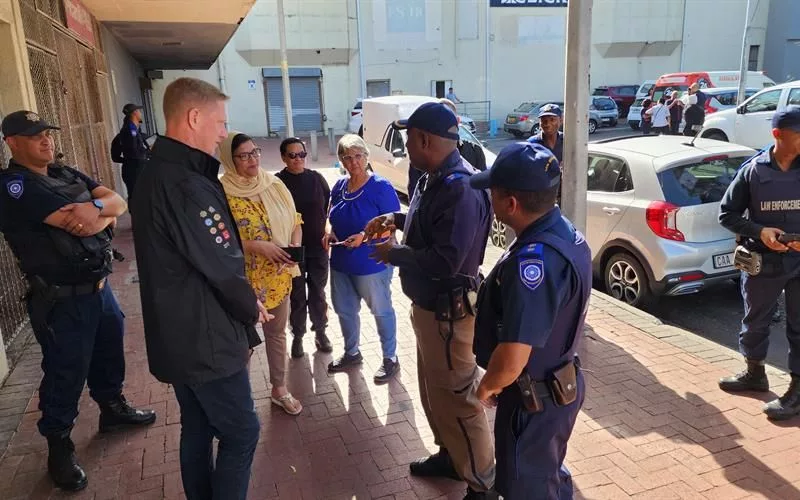Cape Town is expanding its law enforcement project into three CBDs, following the success of the program in their own CBD. The initiative has resulted in 185 arrests and numerous fines in the first three months, and a further 60,683 fines, 1,396 arrests, 22 vehicle impoundments, and 30% drug-related arrests in the following year. The deployment of 50 Law Enforcement and Metro Police officers will be community-oriented, data-driven, and focused on learning from past experiences, aiming to create safer and economically stronger CBDs and cultivate a more secure and vibrant city.
Heading: An Era of Proactive Law Enforcement
Cape Town is deploying 50 Law Enforcement and Metro Police officers to the Central Business Districts of Mitchells Plain, Wynberg, and Bellville, following the success of their project in the CBD. The project resulted in 185 arrests and numerous fines within the first three months. The extension of the project signifies a shift towards a new era of law enforcement that is data-driven, community-oriented, and keen on learning from previous experiences.
In a pioneering initiative aimed at diminish crime and enhance security, Cape Town is embarking on the expansion of its law enforcement activities into the Central Business Districts (CBDs) of Mitchells Plain, Wynberg, and Bellville. This deployment of 50 Law Enforcement and Metro Police officers is inspired by the successful law enforcement project in Cape Town’s CBD. The goal is to bring about significant change to the city’s security setting.
A Successful Precedent
The Cape Town Central Business District law enforcement deployment was launched in July 2022, and involved the placement of 100 Law Enforcement officers. Their mission was to boost visible policing, support fundamental agencies, and ensure compliance with by-laws. The results of this deployment were remarkable. These officers, within their initial three months, were responsible for 185 arrests and issued numerous fines.
The fiscal year of 2023/2024 demonstrated even more impressive outcomes, showcasing the project’s effectiveness and scalability. During this time, the law enforcement officers responded to 20,087 service requests, conducted 21,166 personal searches and 921 vehicle searches, and issued 60,683 fines. Additionally, they made 1,396 arrests and impounded 22 vehicles. Amid a city battling drug-related criminal activities, it’s significant that 30% of these arrests were drug-related, emphasizing the project’s impact in this area.
Extending the Safety Net
This project has made a substantial contribution to the statistical representation of crime and safety in the Cape Town CBD. It has also provided critical insights that the city is now keen to implement, albeit on a reduced scale, in Mitchells Plain, Wynberg, and Bellville. These three CBDs serve as essential economic centers and transit connection points, making them ideal candidates for a safety overhaul.
The deployment will include 26 Law Enforcement officers and 24 Metro Police officers. Bellville will receive 18 officers, while Wynberg and Mitchells Plain will each be assigned 16. The officers’ working hours will initially be from 09:00 to 16:00 daily for a fortnight. However, the city plans to reassess and modify these hours according to operational requirements and the distinct dynamics of each CBD.
More Than Just Enforcement
Alderman JP Smith, the Mayoral Committee Member for Safety and Security, believes this deployment offers these areas an opportunity to witness an enhancement in safety that could in turn stimulate economic growth. “Creating safer environments will increase foot traffic, which will in turn drive economic activity,” Smith stated.
Smith also underscored the value of local knowledge, stating that the allocated resources “will familiarize themselves with the areas and the challenges unique to each, which in turn influences our operational strategies and the quality of the enforcement response.” This localized approach to law enforcement isn’t simply a strategy for operational planning. The communities in these areas will have the opportunity to establish relationships, and trust, with the uniformed services operating in their area. The aim is to promote an informative exchange that benefits all parties involved.
Heading: An Era of Proactive Law Enforcement
This deployment extends beyond a simple reallocation of law enforcement resources. It signifies a strategic step towards a safer, more prosperous Cape Town. It carries the potential to create safer urban areas, build trust between communities and uniformed services, and ultimately, cultivate a city that is as secure as it is vibrant.
Cape Town’s decision to mirror a successful model represents a shift towards a new era of law enforcement that is data-driven, community-oriented, and eager to learn from previous experiences. This bold move towards safer and economically stronger CBDs places Cape Town as a city that is not merely reactive, but proactive in its approach to safety and security.
1. What is Cape Town’s law enforcement project, and where is it being expanded?
Cape Town’s law enforcement project is a community-oriented, data-driven project that aims to create safer and economically stronger CBDs. Following the success of the initial project in the city’s CBD, it is being expanded into the Central Business Districts (CBDs) of Mitchells Plain, Wynberg, and Bellville.
2. What were the results of the initial project in Cape Town’s CBD?
The initial project in Cape Town’s CBD, which involved the placement of 100 Law Enforcement officers, was responsible for 185 arrests and numerous fines within the first three months. In the following fiscal year, the officers responded to 20,087 service requests, conducted 21,166 personal searches and 921 vehicle searches, and issued 60,683 fines. They also made 1,396 arrests and impounded 22 vehicles, with 30% of these arrests being drug-related.
3. How many Law Enforcement and Metro Police officers will be deployed in the expanded project?
The expanded project will involve the deployment of 26 Law Enforcement officers and 24 Metro Police officers, for a total of 50 officers. Bellville will receive 18 officers, while Wynberg and Mitchells Plain will each be assigned 16.
4. What is the goal of the expanded project in the three CBDs?
The goal of the expanded project is to bring about significant change to the security setting of the three CBDs. It aims to diminish crime and enhance security, create safer and economically stronger CBDs, and cultivate a more secure and vibrant city.
5. How will the officers’ working hours be determined?
Initially, the officers’ working hours will be from 09:00 to 16:00 daily for a fortnight. However, the city plans to reassess and modify these hours according to operational requirements and the distinct dynamics of each CBD.
6. What is the value of the localized approach to law enforcement in this project?
The localized approach to law enforcement in this project allows the allocated resources to familiarize themselves with the areas and the challenges unique to each, which in turn influences operational strategies and the quality of the enforcement response. It also provides an opportunity for the communities in these areas to establish relationships and trust with the uniformed services operating in their area, promoting an informative exchange that benefits all parties involved.













